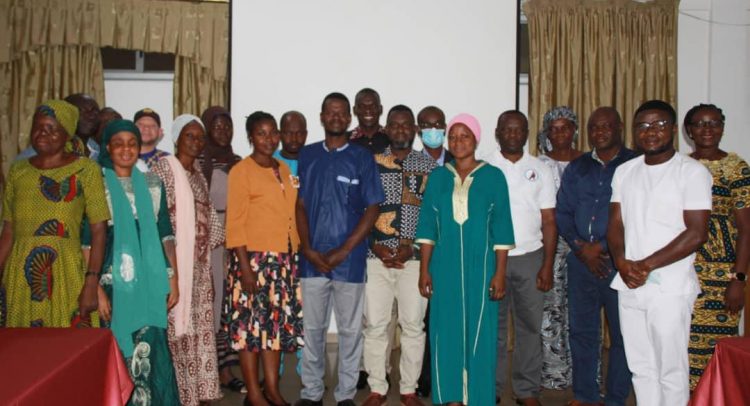Executive Director of the Ghana National Association of the Deaf (GNAD),Mr. Juventus Duorinaah with members in Tamale
The Executive Director of the Ghana National Association of the Deaf (GNAD), Juventus Duorinaah has called on the government to take a look at its policies on mental health and include people with hearing impairment.
“ The policies does not include the Deaf community since 2019-2030, Deaf people are not part of the target group we don’t benefit even though they say something about persons with disabilities,it doesn’t specifically state people who are deaf because we have a special need and they have to provide these services to our members also because if they have basic acknowledge about it then they can go to the appropriate places for the services they need.
He appealed to government to ensure that publication and education on mental health related issues should include Deaf persons for them to also benefit.
“ I know that they use TV and posters and all that we want government to consider Deaf person when they are doing such programmes , we just see people talking and we just watch them what they are saying we don’t know so how do we benefit, so they should add subtitles and interpreters because not all Deaf people can read and so those who can’t read will use the interpreters so that we can all benefit because our mental status is very important.”
The Executive Director GNAD made this known at the dissemination of survey findings to stakeholders in Tamale in the Northern region organized by the Ghana National Association of the Deaf (GNAD) with support from Ghana Somubi Dwumadie (Ghana Participation Programme), a four-year disability programme in Ghana, with a specific focus on mental health funding by the UK aid from the UK government.
The project is a research findings on an evidence based on Deaf people with mental health challenges and the barriers they face.
According to the Executive Director of GNAD, the association in Ghana does not have any evidence-based research on Deaf persons with mental health challenges adding that the research conducted by the association is purposely to get the right information for the Deaf community.
“We want to know what they know about mental health, their acknowledge on mental health because most people Deaf people know about mental health just like our hearing counterparts but the thing is that Deaf people have no acknowledge about mental health on it and this so an opportunity to get an evidence based information then do a dissemination on the research findings to our stakeholders to know how Deaf people can be assisted.”
According to him , the project will provide stakeholders with some information about Deaf persons so that when they are planning their policies Deaf people will be involved regarding mental health.
“ we want to help reduce the stigma and discrimination which is a very serious issue when it comes to mental health even look at what our hearing counterparts face how much more we the Deaf people we even face double of that and being a deaf person and having mental health issues is a big challenge.”
Mr. Duorinaah revealed that Deaf persons do not often go to the hospital because they do not have any acknowledge and where to get help regarding mental health issues.
“ The few of them who are lucky to know about mental health they face communication challenges, the hearing people when we go to the consulting room there are nurses and doctors speak but we the Deaf people our situation is different , there’s a doctor and nurse but both of them can not sign so there’s no communication and that is a big challenge and we have experienced that in the research. There are some Deaf people who go with their parents and their parents sit down and their parents do the talking for them then they take the medicine so they do not know what was said because they are not involved in the diagnosis.”
He indicated that the findings also discovered that most deaf people think that mental health issue cannot be healed which is dangerous noting that they will educate the deaf community on mental health and let the know that mental health issues can be cured.
“ we have to help them know that there’s always a support service for them and because they feel that way they think there’s no need to even go to the hospital so that is why we are trying to do this project to try and change their perception and now we are in a technological world now which means that TV stations can add subtitles to their news and everything so that if even there’s no interpreter at least the people can also read the subtitles and know what is going on which will greatly help the deaf community.”
He noted that the Ghana National Association of the Deaf (GNAD)will present the findings and a position paper to the appropriate stakeholders in Accra to enhance the changes of the deaf community to get access to mental health services.
Mr. Duorinaah encouraged the deaf community to always visit the nearest hospital for some support if they feel they are not well especially when they feel anything that is not normal with them.
FROM Eric Kombat, Tamale


